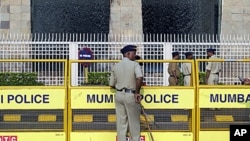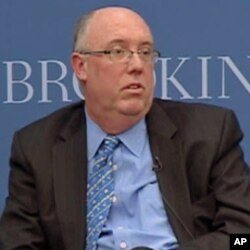An author who has advised four US presidents, including President Barack Obama, says the biggest threat coming from the region is not al-Qaida and Osama Bin Laden but the possibility of another Mumbai style attack by Pakistan-based militants that could trigger a war between India and Pakistan. Bruce Riedel of the Brookings Institution has just released his new book on US-Pakistan relations.
The Mumbai attacks, allegedly planned and carried out by Pakistan-based Lashkar-e-Toiba, are still fresh in memory.
India was stunned and its internal security system put to shame.
After the attack, New Delhi was under pressure to retaliate and take out terrorist bases it claims are located across the border in Pakistan.
But Prime Minister Manmohan Singh used restraint and has been pressing Pakistan to speed up the trial of the alleged perpetrators.
Bruce Riedel, of the Brookings Institution, says India's response was not what it wanted but what it was able to do under the circumstances.
“It is because Indian generals, politicians and diplomats can't figure out a way to strike back against Pakistan without starting an escalatory ladder,” Riedel said. “India's patience next time is not going to ponder escalatory ladders, and they are going to find a way to strike back."
He says the US must work to bring India and Pakistan to the table and Washington should try to revive a draft agreement between India and Pakistan on Kashmir, claimed by both countries. The agreement was drafted in secret just before Pakistan's President Pervez Musharraf resigned in 2008.
India controls two-thirds of Kashmir and Pakistan the rest. A UN-backed Line of Control separates them.
Riedel says the proposed agreement is a win-win for both India and Pakistan and very good for Kashmiris. “The line of control will become the border, but such a permeable border that both sides can claim success. India could say the territorial integrity of India has been respected, and Pakistan could say there is no border anymore and Kashmir is one entity,” he stated.
He says Washington should enlist countries like China - that have good relations with both India and Pakistan - to press them for peace. “That dynamic in the relationship between Islamabad, Beijing and New Delhi should be used as leverage,” he said. “China needs to be there, Saudi Arabia needs to be there. United Arab Emirates needs to be there.”
Riedel says if Washington helps bring peace between Pakistan and India, removing Pakistan's obsession with India as a threat, Islamabad will fully cooperate with the U.S. in the fight against the Taliban and al-Qaida
Riedel says to get the two sides to revive the agreement; it will take someone of Secretary of State Hillary Clinton's stature.





